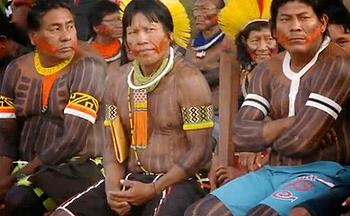
BRASILIA, Brazil, August 16, 2012 (ENS) – A halt to construction of the controversial Belo Monte Hydroelectric Dam on the Amazon’s Xingu River was ordered late Monday by a federal court in the Brazilian capital. If built, Belo Monte would be the world’s third-largest dam, diverting up to 80 percent of the Xingu River from its natural course.
Indigenous people of the Xingu River region and conservationists from Brazil and other countries have been demonstrating against the proposed dam for years.
They object that Belo Monte’s two planned reservoirs and two 75 kilometer-long canals would flood a total of 668 square kilometers of which 400 km2 is forest, releasing the greenhouse gas methane and forcing some 20,000 people from their homes in Altamira and Vitoria do Xingu.

In its ruling, the Federal Court of the 1st Region, TRF1, upheld an earlier decision that declared Congress’s authorization of the project in 2005 to be illegal.
The court ruled that the Brazilian Constitution and International Labour Organization Convention 169, to which Brazil is a party, require that Congress can only authorize the use of water resources for hydroelectric projects after an independent assessment of environmental impacts and subsequent consultations with affected indigenous peoples.
Federal Judge Souza Prudente, who authored the ruling, said that the views of affected communities must be taken into consideration. “The property is different for the Indian to white. The Indian has a mystical vision of the property, and the Constitution guarantees it.”
“The court’s decision highlights the urgent need for the Brazilian government and Congress to respect the federal constitution and international agreements on prior consultations with indigenous peoples regarding projects that put their livelihoods and territories at risk. Human rights and environmental protection cannot be subordinated to narrow business interests,” said Judge Prudente.
Project consortium Norte Energia, S.A., led by the parastatal energy company Eletrobras, faces a daily fine of R$500,000 (US$250,000), if it does not comply with the suspension.
The consortium is expected to appeal the decision in the Brazilian Supreme Court.
“This latest court ruling vindicates what indigenous people, human rights activists and the Federal Public Prosecutor’s Office have been demanding all along,” said Brent Millikan of the nonprofit conservation group International Rivers, based in Brasilia.
“We hope that President Dilma [Rousseff]’s attorney general and the head judge of the federal court, TRF1 will not try to subvert this important decision, as they have done in similar situations in the past,” Millikan said.
Norte Energia has not yet received communication from Eletrobras on the court order. The construction site was quiet on Tuesday because it was a holiday in Para commemorating the accession of the state to Brazil.

The court ruling came on a statement filed by federal prosecutors in the state of Pará where the dam construction is taking place. The prosecutors argued that Congress should have determined that affected communities must heard before, not after, approving the 2005 legislative decree, authorizing the work.
“Only in a dictatorship” is it done posthumously, the prosecutors argued. “The Constitution says that previous studies have to be done.”
In the latest of many protests, indigenous people from the ethnic Juruna, Xikrin, Volta Grande Arara and Kayapo tribes camped at the dam site from June 21 through July 11, keeping about 2,500 workers off the job.
After two days of meetings in Altamira July 9 and 10, an understanding was signed between Norte Energia and the Middle Xingu indigenous leaders.
The indigenous people withdrew from their encampment, and the company agreed to some of their demands.
The parties agreed to establish two committees – one to monitor the flow downstream of the Xingu River and another to monitor the conditions of the Basic Environmental Project – Indigenous Component.
The meetings were conducted by Norte Energia CEO Carlos Nascimento, who was accompanied by a representative of the Secretariat of the Brazilian Presidency, Nilton Tubino.
Also present was Marta Maria Azevedo, the president of FUNAI, the National Indian Foundation, the Brazilian government body that establishes and carries out policies relating to indigenous peoples.
Negotiations involved not only the Indians occupying the site, but other affected ethnic groups as well.
Regarding the protection of indigenous lands, Norte Energia has committed to deliver five operational bases and two checkpoints. The first two, to be deployed in the villages of Arara and Koatiemo, were promised for completion in September.
Nascimento said dialogue with the communities must be maintained. “Understanding always prevails,” he said at the end of the meeting, noting that it took two days of intense negotiations, and a joint effort with government institutions to come to agreement. “We have a responsibility to fulfill the development of the terms of the negotiations respecting the culture of these peoples.”
Copyright Environment News Service (ENS) 2012. All rights reserved.
© 2012, Environment News Service. All rights reserved. Content may be quoted only with proper attribution and a direct link to the original article. Full reproduction is prohibited.
